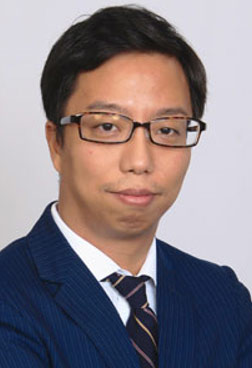
New colorectal cancer (CRC) statistics in the U.S. are alarming. Today, it is the third most common cancer worldwide, is the second most deadly cancer in men and women combined, and of all cancers, CRC is expected to take the most lives of people under 50 by 2030.
However, with proper screening, CRC can be preventable, treatable, and beatable.
Colorectal Cancer Awareness Month is observed annually in March to highlight the importance of screening for colorectal cancer and to increase awareness that CRC is preventable, treatable, and beatable.
In this Q&A, Tai Fujita, General Manager of endoscopy at FUJIFILM Healthcare Americas Corporation, shares information about the disease, the importance of industry leaders forming partnerships to raise awareness on this critical topic, and to shed light on how Fujifilm’s suite of endoscopic innovations is advancing the fight against CRC.
Colorectal cancer is an umbrella term used for cancer of the large intestine (colon), which is the lower part of your digestive system, and rectal cancer, which occurs in the last several inches of your colon.
According to the American Cancer Society, the lifetime risk of developing colorectal cancer is about 1 in 23 for men and 1 in 25 for women.
Almost all CRCs begin as precancerous polyps — or abnormal growths — in the colon or rectum. Screening can find precancerous polyps so they can be removed before they turn into cancer and can also detect CRC early when treatment works best.
Colorectal cancer screening is of paramount importance for preventing and catching colon cancer early.
Experts recommend that patients should begin colon screening at the age of 45. However, it is important that everyone is aware of the symptoms of CRC — especially since we are seeing more cases among younger generations.
While symptoms are usually subtle during the early stages of colorectal cancer (which is why regular screening is vital), it’s critical that a person brings potential symptoms up to their doctor. If a patient is below 45 and has any (or several) symptoms below, their doctor will recommend a colonoscopy.
Symptoms to be aware of include:
We launched our first endoscope system just over 50 years ago and have been innovating ever since. In fact, we’ve launched more than 20 products in the U.S. since 2018 with an aim to address both screening AND treatment of CRC. That combined effort means our technology supports physicians with the ability to visualize, detect, and characterize lesions and polyps, and also remove any that might be of concern.
 Knowing that Artificial Intelligence (AI) is helping to give physicians a greater look at what’s happening inside the body, we were eager to launch Fujifilm’s newest AI technology for endoscopy — known as CAD EYE. Studies show that the technology is supporting physicians by helping to identify polyps during colonoscopy procedures in real-time.
Knowing that Artificial Intelligence (AI) is helping to give physicians a greater look at what’s happening inside the body, we were eager to launch Fujifilm’s newest AI technology for endoscopy — known as CAD EYE. Studies show that the technology is supporting physicians by helping to identify polyps during colonoscopy procedures in real-time.
Also in 2024, Fujifilm introduced SCALE EYE®, a new and innovative endoscopic imaging technology for measuring colonic polyps. A patient’s polyp size is important, as the size helps the endoscopists determine how often a patient should return for follow-up screening or how they should remove the polyps.
While the industry has previously had access to a few tools like physical endoscopic rulers to help measure polyps once they are removed, they are cumbersome to use and time-consuming. Early results of Fujifilm’s SCALE EYE technology — a virtual measuring tool visible through the endoscope at the touch of a button — show it is superior in terms of accuracy and time compared with other traditional methods.
Creating a healthier world is the root of everything we do at Fujifilm, and certainly drives our innovation for our endoscopy business.
We know the impact our technology can have on CRC patient outcomes, but only if people get screened.
Our decision to partner with Fight CRC was an easy one. We share the same mission to raise awareness, boost screening compliance for early detection, and ultimately improve colorectal cancer patient outcomes.
We also appreciate the opportunity to educate patients on how technology can impact their care. So much of our work is done directly with physicians, which is critical, but we have found patients are very interested in how physicians are able to see inside their bodies.
Fujifilm is advancing patient care and physician education at hundreds of clinical settings across the U.S., from leading academic medical centers to regional ambulatory surgery centers (ASCs). Our recent growth and expansion in endoscopy technology makes us the right choice and best investment for almost all endoscopy practices.
Our fully integrated Fujifilm endoscopy systems have been installed at Dartmouth-Hitchcock Medical Center, in Colorado at PEAK Endoscopy, as well as at the University of Florida, New York University, Ohio Gastro Group, in Virginia at VCU Health, in Washington State at Providence St. Joseph’s, and in Jacksonville at Mayo Clinic to name a few.
One of the most exciting installations is at Brigham and Women’s Hospital in Massachusetts which has been Fujifilm’s long-term endoscopy research partner and collaborator and is consistently ranked in the top tier of hospitals in the nation.
Recognizing the importance and value of educating physicians on new technologies and procedural techniques, in 2022, Fujifilm equipped the 15,000-member American Society for Gastrointestinal Endoscopy (ASGE) Institute for Training & Technology, and global leader of advancement and education in the field of GI endoscopy, with 16 of Fujifilm’s industry-leading ELUXEO® Endoscopic Imaging Systems and our 700 Series Endoscopes. The suite of comprehensive endoscopy solutions was installed in August 2022 and is utilized throughout ASGE’s live and virtual training programs for both endoscopy fellows and seasoned endoscopy professionals.
We take pride in forming strategic partnerships with leading physicians from numerous prominent healthcare institutions around the world. These renowned doctors provide input that helps us optimize existing technology and contributes to the development of next-generation advanced technologies that can lengthen and save lives.
CRC screening can lengthen and save lives. If you are of the screening age to get a colonoscopy — go. If you are not of the screening age, learn the potential symptoms of colorectal cancers and talk to your doctor if you have concerns.
The statistics behind CRC are unsettling, but colon cancer has never been more treatable and curable than it is right now thanks to innovations in endoscopy and additional screening tests. Knowledge is power, and so a personal prevention plan developed together with your doctor can help set you on the path to share many more milestones with your loved ones.
 Tai Fujita, General Manager of Endoscopy Product and Marketing for FUJIFILM Healthcare Americas Corporation. At Fujifilm, we leverage our 90 years of imaging expertise and innovation to support the early detection and treatment of disease worldwide. With a dedication to developing technologies that advance patient care, Fujifilm takes pride in being a market leader and trusted partner in the field of endoscopy.
Tai Fujita, General Manager of Endoscopy Product and Marketing for FUJIFILM Healthcare Americas Corporation. At Fujifilm, we leverage our 90 years of imaging expertise and innovation to support the early detection and treatment of disease worldwide. With a dedication to developing technologies that advance patient care, Fujifilm takes pride in being a market leader and trusted partner in the field of endoscopy.